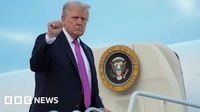The Indian-American community in Texas and across the United States has been left reeling after the brutal beheading of Chandra Mouli "Bob" Nagamallaiah, a 50-year-old motel manager originally from Karnataka, India. The shocking attack, which took place on September 10, 2025, at the Downtown Suites Motel in Dallas, has reignited fierce debate over U.S. immigration enforcement and the policies that govern the deportation of undocumented immigrants with criminal backgrounds.
Nagamallaiah, who had moved to the United States in 2018 after completing his education in Bengaluru, was known as a hardworking and well-respected member of the local community. He lived and worked at the Downtown Suites Motel, where he was attacked in front of his wife and 18-year-old son. The assault, described by police as a beheading carried out with a machete, followed a heated argument with his co-worker, Yordanis Cobos-Martinez, over a broken washing machine, according to BBC and other outlets.
The accused, Cobos-Martinez, 37, is an undocumented Cuban immigrant with a lengthy criminal record, including prior arrests for child sexual abuse, grand theft auto, and false imprisonment. U.S. Immigration and Customs Enforcement (ICE) confirmed that he had previously been detained and was slated for deportation. However, in January 2025, he was released on an order of supervision after Cuba refused to accept his return due to his criminal history, as reported by the Department of Homeland Security and Reuters. He now faces capital murder charges and remains in custody at Dallas County Jail without bond, awaiting trial. Dallas Police confirmed that the attack was captured on the motel’s CCTV system.
The killing has led to an outpouring of grief and outrage within the Indian-American community, with many calling for justice and a thorough review of current immigration policies. Congressman Raja Krishnamoorthi voiced his horror at the crime, stating, "My deepest condolences go to his family. The perpetrator must be prosecuted to the full extent of the law." Community organizations, including the Vishwa Hindu Parishad of America, Indiaspora, and the Hindu American Foundation, have all issued strong condemnations. Suhag Shukla, Executive Director of the Hindu American Foundation, remarked, "In times like this, we must remember our shared humanity and choose patience and acceptance over violence."
The Consulate General of India in Houston has been actively supporting Nagamallaiah’s family. Consul General DC Manjunath confirmed that the mission is "in contact with the family and local authorities, providing all necessary support." The funeral for Nagamallaiah was held on September 13, 2025, in Flower Mound, Texas, with family and close friends in attendance. In a testament to the community’s solidarity, a fundraiser to support his wife and son has already raised over $321,000, according to PTI and NDTV.
The tragedy has also become a flashpoint in the ongoing debate over U.S. immigration policy, particularly concerning the handling of undocumented immigrants with criminal backgrounds. President Donald Trump, in a series of statements on his Truth Social platform, placed the blame squarely on what he termed the "lenient policies" of his predecessor, President Joe Biden. Trump wrote, "I am aware of the terrible reports regarding the murder of Chandra Nagamallaiah, a well-respected person in Dallas, Texas, who was brutally beheaded in front of his wife and son by an illegal alien from Cuba who should never have been here."
He continued, "Rest assured, the time for being soft on illegal immigrant criminals is over under my watch! Secretary of Homeland Security Kristi Noem, Attorney General Pam Bondi, Border Czar Tom Homan, and many others in my Administration, are doing an incredible job in making America safe again." Trump also vowed that Cobos-Martinez "will be prosecuted to the fullest extent of the law" and "charged with murder in the first degree." He has made tougher enforcement against undocumented migrants a central plank of his policy platform, using this case to underscore his stance.
Trump’s remarks have drawn sharp lines in the political discourse. Supporters of stricter immigration enforcement argue that the current system’s inability to deport individuals like Cobos-Martinez leaves communities vulnerable. Assistant Secretary of Homeland Security Tricia McLaughlin pointed to policy gaps, noting, "This is exactly why the Trump Administration was removing criminal illegal aliens to third countries such as Uganda and South Sudan," referencing previous efforts to find alternative destinations when home countries refuse to accept deportees.
Critics, however, caution against using tragic events to justify sweeping policy changes that may have broader humanitarian implications. Some community leaders emphasize the importance of balancing public safety with due process and humane treatment for all immigrants. The debate has highlighted the complex reality facing U.S. immigration authorities: when countries like Cuba refuse to accept their nationals with criminal records, the options for removal become severely limited, forcing officials to release such individuals under supervision—a practice that has now come under intense scrutiny.
The case has also sparked conversations about the responsibilities of both sending and receiving countries in managing the flow of migrants and the repatriation of those with criminal convictions. U.S. homeland security officials acknowledge that the situation exposes significant gaps in current policy, and the incident has prompted renewed calls for bipartisan efforts to address these loopholes.
For the Indian-American community, the loss of Chandra Mouli Nagamallaiah is deeply personal and symbolic of broader anxieties. As Indiaspora stated, "Every person deserves safety and dignity regardless of identity." The Vishwa Hindu Parishad of America echoed this sentiment, calling the murder part of a "disturbing national trend" and demanding a full investigation and a national inquiry into what it described as "America’s collapsing civil dialogue."
As the legal process unfolds and the family mourns their loss, the killing of Chandra Mouli Nagamallaiah stands as a stark reminder of the human cost at the intersection of immigration policy, public safety, and community trust. The outcome of the case, and the policy debates it has reignited, will likely echo far beyond the walls of a Dallas motel, shaping conversations about justice, accountability, and the values that underpin American society.



